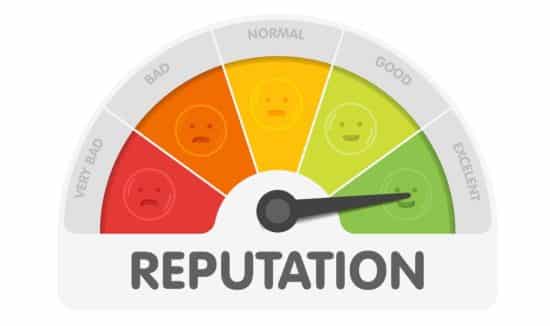Executive Report

Perception can make or break any deal. A brand’s reputation is becoming increasingly more important with the Internet and smartphones at our fingertips.
How can you harness the power of positivity for your brand? Reputation marketing uses positive brand assets for advertising content and promotional materials through traditional and digital marketing channels alike.
Examples of reputation marketing assets include testimonials, online ratings, social media mentions, community awards, and of course, customer reviews. When done correctly, reputation marketing can increase sales, enhance a brand, decrease costs, boost revenue, and improve business metrics.
With 90% of consumers reporting that reviews are more important than anything from a salesperson or marketing materials, highlighting positive mentions and comments has never been more important — or easier.
How to Create a Reputation Marketing Strategy
Reputation marketing should not be confused with reputation management, which involves managing your existing reputation by responding to online feedback across social media, resolving customer complaints, and, sometimes, burying negative reviews and reports. Reputation marketing takes a more proactive approach to both improve your reputation and market it at the same time.
1. Assess Your Brand
The first step in any reputation marketing strategy is to assess the brand itself. When you do a quick search across Google, Facebook, Instagram, and YouTube, is it more positive or negative? Also, dig into how your competitors are reaching their audience — does the content seem genuine? Do you believe the sentiment behind the message?
2. Correct The Record
Wikipedia was once looked down upon as a makeshift encyclopedia. Now, it is one of the most trusted resources on the internet. As one of the first results in any Google search, checking the accuracy and tone of your company page is top priority.
3. Solicit Reviews
Encourage customers to leave reviews on your website and third-party sellers like Amazon, but never ask for a specific rating. For search engine optimization, ratings and reviews are critical. A recent study showed that having at least 10 customer reviews increases search traffic by about 20%. Set up a simple automation to email every customer a few days after receiving your product, asking for their experience and to leave a simple review.
4. Update Your Google Business Information
Google My Business listings are often forgotten by business owners but are a first point of reference for many smartphone users. Google business listings are an easy place to find location, phone number, hours, website, reviews, photos, and more, all in one simple place. Checking the accuracy of this information quarterly and responding to reviews can make a big impact.
5. Monitor Results
Once you have your reputation marketing strategy in place, check in every few weeks to see how the reputation is improving. Negative reviews and comments are bound to happen, but a strong reputation marketing plan means having more time to handle issues before they escalate.

Reputation Marketing Mistakes to Avoid
Reputation marketing can be a lot of things. What it isn’t, however, is repairing a damaged brand reputation with positive marketing.
Reviews and ratings are a critical reputation marketing tool, but inauthentic reviews or paid reviews can be bad for business. While the assumption is quantity over quality, there are plenty of ways to tell if brands are soliciting or faking reviews for clicks. Organic information will always be more well received, even if there are only a handful of reviews.
Responding to reviews is also an important step in reputation marketing, but that means responding to the good and bad reviews. A simple yet personalized thank you message is all you need. Be sure never to use a canned response!
Some businesses made a decision that if the internet can be negative, we should avoid it altogether. Often, no internet and social media presence can be more damaging than a negative one. Social media is a blessing and a curse, but it gives you a free platform to speak directly to your audience all day, every day.
In today’s market, the scrutiny is unending. Inconsistency is a constant mistake brands make, and often by accident. When a team handles your reputation marketing, some members can be more on brand than others, leading to discrepancies across comments and content. Build a brand guide for how to respond to all types of feedback to keep the team unified.
Everyone knows there is a human behind the screen, pulling the levers like the Wizard of Oz. However, blurring the line between personal and professional can be damaging. Keep the brand page strictly professional, but repost appropriate content from a CEO’s personal account or Instagram stories from employees’ experiences throughout the day.
Contact Us Today
Reputation marketing is crucial for your business, but so many are missing the opportunity to take these simple steps and engage with their audience. Our expert digital marketing team can help you plan the best way to manage and market your reputation. Contact us to set up a free consultation.
"*" indicates required fields



